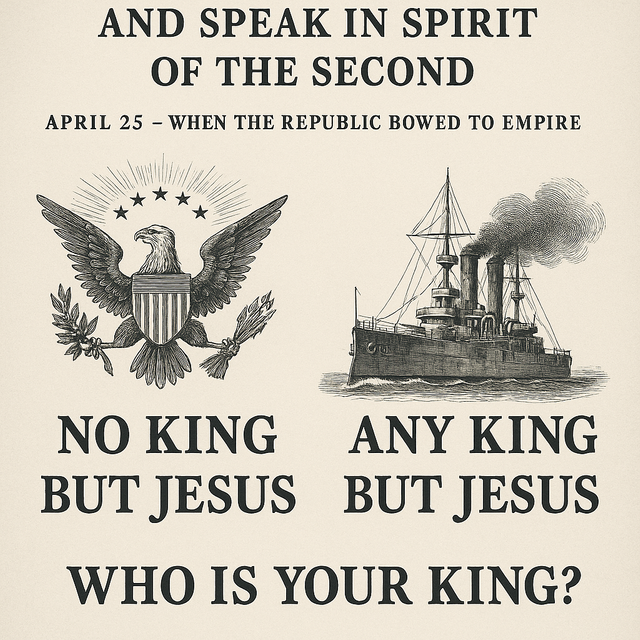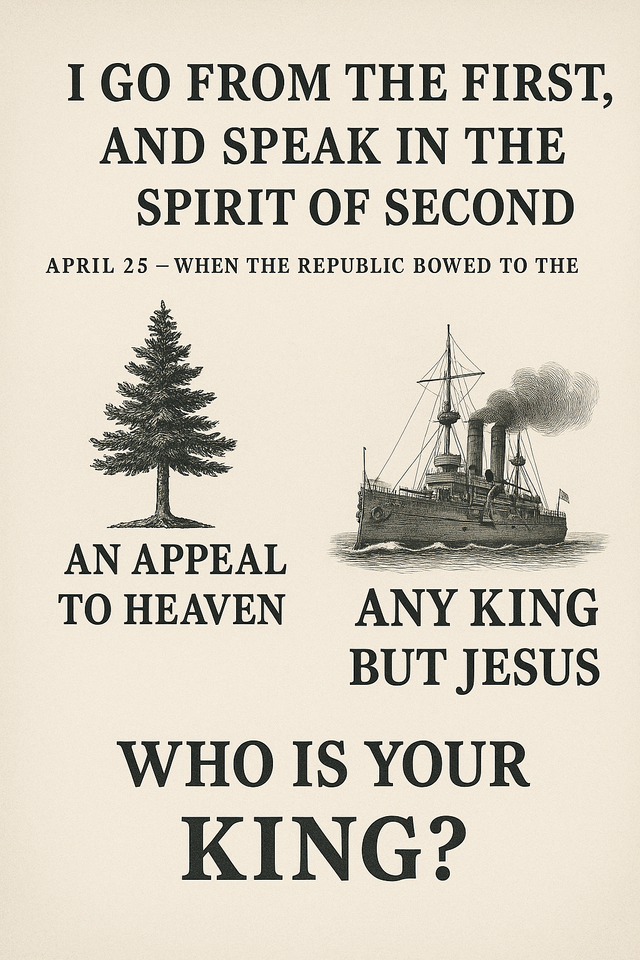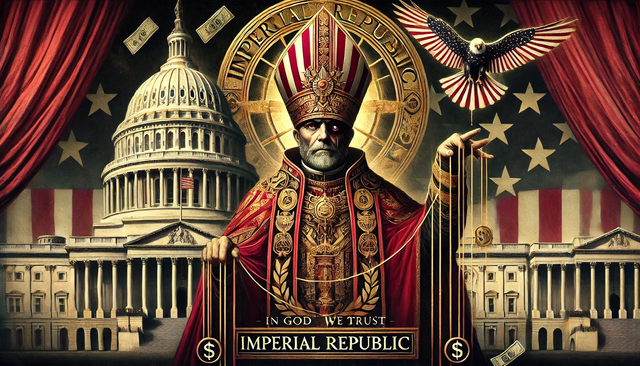This Day in History April 25 1898 the Imperial Republic?
April 25 1898 When the Republic Bowed to the Empire
⸻“I Go from the First, and Speak in the Spirit of the Second”
Introduction
April 25, 1898.
Spain Declares war on America and Congress declares war on Spain Retroactively
Newspapers shout: “Remember the Maine!” The people cheer.
But behind the slogans and speeches, something far deeper was taking place:
The republic born of “No King but Jesus” was giving way to a new order—one that would crown any king but Him.
This was not the beginning of American empire—but its open coronation, built on media deceit, economic centralization, legal fiction, and religious replacement.
⸻
I. The Republic That Was — “No King but Jesus”
“We hold these truths to be self-evident…”
— Declaration of Independence (1776)
The First America was a covenant of states—imperfect, yes, but built on consent and accountability, not force or fiat.
Its early motto was not “In God We Trust,” but “No King but Jesus.”
A cry that echoed the biblical model of divine kingship:
“But the Lord said unto Samuel… they have not rejected thee, but they have rejected me, that I should not reign over them.”
— 1 Samuel 8:7
God warned Israel that a king would lead to military conscription, taxation, confiscation, and servitude (1 Sam. 8:11–18). The American founders knew it too. That’s why they designed a constitutional republic, not a monarchy, not a corporate state.
II. The Empire That Rose — “Any King but Jesus”
“Through his policy also he shall cause craft to prosper… and by peace shall destroy many.”
— Daniel 8:25
From 1861 to 1900, the republic died by degrees. Not in battle—but in paperwork, pledges, and lies:
• 1861: Lincoln provokes the South, leading to the war at Fort Sumter. Even General Beauregard, who fired the first shot, was a Roman Catholic trained by Jesuits—another thread of Rome woven into America’s unraveling.
• 1863–64: The National Banking Acts begin to dismantle hard currency and establish centralized monetary control.
• 1868: The 14th Amendment redefines citizens as subjects of “The United States,” not of their states.
• 1871: Washington, D.C. is incorporated as a municipal corporation, blurring the lines between governance and business.
• 1892: A socialist Baptist minister, Francis Bellamy, writes the Pledge of Allegiance, training children to bind themselves to a flag and state—not Christ.
• 1898: The Maine explodes. The press cries for war. A media-manufactured crisis births an overseas empire.
The Second America spoke liberty, but built empire.
It printed “In God We Trust”—but the God was unnamed, undefined, and unaccountable.
“Having a form of godliness, but denying the power thereof: from such turn away.”
— 2 Timothy 3:5
⸻
III. Religious Shifts: Rome’s Repositioning
While Spain was Catholic, American Catholics like John Gilmary Shea worked overtime to portray the Church as loyal to the republic, not its enemy. In The Cross and the Flag, Shea presents Rome as a hidden architect of America’s greatness—even as Catholic colonies in Cuba and the Philippines fell to U.S. forces.
But Rome always knows how to change robes midstream. From inquisitor to patriot, from kingmaker to judge, she rides the beast of every era (Rev. 17:3).
“And I saw a woman sit upon a scarlet coloured beast, full of names of blasphemy…”
— Revelation 17:3
⸻
IV. The Economics of Idolatry
“A false balance is abomination to the Lord: but a just weight is his delight.”
— Proverbs 11:1
In place of honest weights came paper promises.
In place of gold and silver came debt-backed fiat.
By the time “In God We Trust” was added to coins (1864), it wasn’t a confession of faith—it was a mask for monetary apostasy. Later, it would be stamped onto worthless Federal Reserve notes—not to honor God, but to give divine legitimacy to man-made currency.
This was not honoring God. It was using His name in vain.
V. The Courts of the Corporation
“Woe unto them that decree unrighteous decrees…”
— Isaiah 10:1
The federal judges ruling today from D.C. and its circuits operate under a corporate legal fiction, not the organic Constitution.
• Their authority stems from Title 28 U.S. Code, built on post-14th Amendment federal supremacy—not state sovereignty.
• Many politically charged cases—especially those targeting Donald Trump—are litigated within this jurisdictional framework of the D.C. corporation, not under common law or republican restraint.
Their robes carry the spirit of empire—not the law of liberty.
⸻
VI. The Final Question: Who Is Your King?
“The kings of the earth set themselves… against the Lord, and against his anointed…”
— Psalm 2:2
The First said: “No King but Jesus.”
The Second says: “Any king but Jesus.”
And every law, every currency, every war cry—from “Remember the Maine” to “Build Back Better”—has been an attempt to enthrone a substitute Christ.
But there is only One King who reigns in righteousness, who wore a crown of thorns before wearing a crown of gold.
⸻
“These shall make war with the Lamb, and the Lamb shall overcome them: for he is Lord of lords, and King of kings…”
— Revelation 17:14
⸻
Conclusion: April 25 Was Their Coronation. Calvary Was His.
The empires of this world—built on lies, debt, and dominion—have already been judged.
Their kings will fall. Their flags will burn. Their pledges will vanish.
But Christ still reigns, and He will not share His throne.
⸻
Choose your King.
Serve the true Kingdom.
Speak the truth in a time of deception.
References to check out:
Footnotes & References
1. 1 Samuel 8:7–18 — God warns Israel about the consequences of appointing a king: taxation, conscription, and oppression. This passage sets the biblical precedent for distrusting centralized human authority.
2. Daniel 8:25 — Refers to a ruler who uses “craft” and false peace to destroy many, echoing the mechanisms of empire-building through manipulation and deception.
3. Proverbs 11:1 — “A false balance is abomination to the LORD.” Applied to fiat currency and centralized banking as violations of biblical financial principles.
4. 2 Timothy 3:5 — “Having a form of godliness, but denying the power thereof.” Used to critique nationalistic religion devoid of true faith.
5. Isaiah 10:1 — “Woe unto them that decree unrighteous decrees.” Points to federal judges issuing rulings from a corporatized D.C. framework.
6. Psalm 2:2 — “The kings of the earth set themselves… against the Lord, and against his anointed.” A prophetic insight into worldly rebellion against Christ’s authority.
7. Revelation 17:3, 14 — The woman riding the beast symbolizes Rome’s religious system entwined with worldly power. Christ, the Lamb, overcomes all false kings.
8. “No King but Jesus” — A slogan popularized during the American Revolution, associated with New England patriots and the Black Robe Regiment of colonial preachers.
9. John Gilmary Shea, The Cross and the Flag (1899) — Catholic historian portraying Catholicism as a foundational force in American patriotism and wars.
10. Francis Bellamy and the Pledge of Allegiance — Bellamy was a Christian socialist; his pledge (1892) was designed to foster national unity and statism through school rituals. “Under God” was added in 1954 during the Cold War.
11. National Banking Acts (1863–1864) — Legislation that centralized banking, created national currency, and weakened state financial independence.
12. Organic Act of 1871 — Incorporated Washington, D.C. as a municipal corporation, changing its governance structure and paving the way for centralization.
13. USS Maine Explosion (1898) — The cause of the explosion was never definitively proven to be an act of war. The incident was heavily publicized by yellow journalism to justify conflict with Spain.
14. General P.G.T. Beauregard — A Roman Catholic general who ordered the firing on Fort Sumter, the symbolic start of the Civil War.
15. Title 28 U.S. Code — The legal framework governing federal judiciary and procedure, based in post-14th Amendment centralized authority.


